Existing types of MOOCs and approaches to teaching
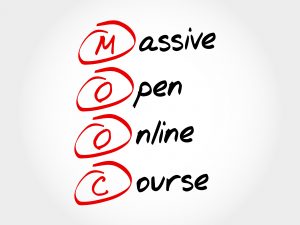 Ever wonder what the ‘x’ in xMOOC stands for, or how the MOOC phenomenon started?
Ever wonder what the ‘x’ in xMOOC stands for, or how the MOOC phenomenon started?
This paper will walk you through how the historical development of MOOCs led to two main schools of thought regarding pedagogy. You will then explore the European context before delving into the influence of Learning Design and open pedagogy.
Setting the scene for MOOC provision in Europe
 From courses on mindfulness to an introduction to marketing at universities and businesses across Europe the potential of using MOOCs as a learning tool and opportunity for partnership between their worlds has begun to rise.
From courses on mindfulness to an introduction to marketing at universities and businesses across Europe the potential of using MOOCs as a learning tool and opportunity for partnership between their worlds has begun to rise.
For learners finding a MOOC to participate in has never been easier, with platforms showcasing and listing the available MOOCs growing, and easily available on the Internet.
This paper maps out the existing MOOC provision, gives a theoretical background to their use, and sets out the distribution of current MOOC users within the E28, giving the reader an insight into the use and availablility of MOOCs within Europe.
Fostering Innovation and Creativity through MOOCs
 The Potential of MOOCs for Innovation and Creativity Centred Education
The Potential of MOOCs for Innovation and Creativity Centred Education
There are various factors for the exponentially increasing popularity of MOOCs.
MOOCs offer a diverse community of participants the opportunity to share ideas and get deeply involved in the subject.
MOOCs have always been a great format to exchange ideas among participants, to study and develop creative processes and foster innovation.
The article outlines some of the most important determinants of successful MOOCs aiming the development and fostering the sense of initiative and creativity.
BizMOOC presented at the European Commission
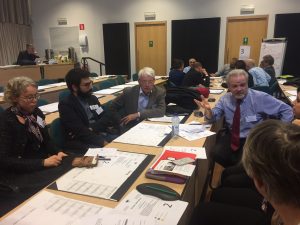 Christian Friedl of FH JOANNEUM and Thomas Neumann of AVL List GmbH represented BizMOOC at the Thematic Cluster Meeting on Knowlegde Alliances at the European Commission premises in Brussels on 8-9th of December 2016. Our project was invited as one of the few selected Knowledge Alliances in the 2014 and 2015 Calls and the opportunity of networking and creating synergees with other initiatives have been extensively used.
Christian Friedl of FH JOANNEUM and Thomas Neumann of AVL List GmbH represented BizMOOC at the Thematic Cluster Meeting on Knowlegde Alliances at the European Commission premises in Brussels on 8-9th of December 2016. Our project was invited as one of the few selected Knowledge Alliances in the 2014 and 2015 Calls and the opportunity of networking and creating synergees with other initiatives have been extensively used.
MOOCs as a solution to bridge the skills gap
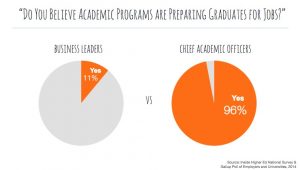 New Skills agenda for Europe
New Skills agenda for Europe
The BizMOOC project addresses how MOOC can be used for business. Different studies imply that there exists a gap on the skills needed in Europe and the skills people have. Recently the EC launched a new Skills agenda for Europe.
The new Skills Agenda for Europe launches a number of actions to ensure that the right training, the right skills and the right support is available to people in the European Union. A study of CEDEFOP in 2015 indicated that Skill shortages and gaps in European enterprises. Genuine skill shortages affect a small group of dynamic, internationally oriented European enterprises in specific economic sectors (health and social care, ICT, advanced manufacturing). Some studies indicate that there is a mismatch between academic programs and the skills needed for jobs. The BizMOOC specifically aims at these issues – and is using MOOCs to address these skills issues. It is a knowledge alliance to enable a European-wide exploitation of the potential of MOOCs for the world business.
Defining the context for MOOCs, online courses and open education
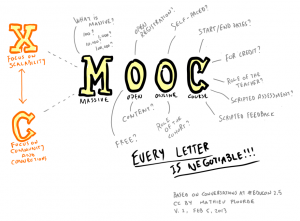
Do you know what acronym MOOC means? Which definition do you agree with? When is a course „Open“ and when is it „Online“?
Answers to these questions can be found at one of 14 discussion papers prepared withing BizMOOC project.
Picture: MOOC poster explores the meaning of “Massive Open Online Courses” by Mathieu Plourde (CC-BY licenced)
IRI2016 – and BizMOOC was there
Austrian results of the BizMOOC survey presented
“Potentials and Barriers of MOOCs for Higher Education Institutions – The case of Austrian HEIs” is the name of a publication based on a data extract of the BizMOOC survey results. The paper was elaborated by Anita Macek and Christian Friedl of FH JOANNEUM and presented at the IRI 2016 conference in Budapest on 27th of November 2016. A follow-up publication is currently in preparation.
We will keep you updated.
First research outcomes presented at the annual EADTU conference in Rome
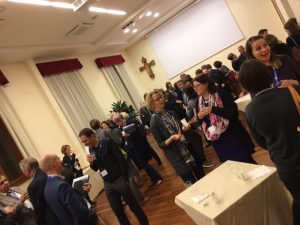 MOOCs-why(not)? Opportunities and barriers for European universities and organisations
MOOCs-why(not)? Opportunities and barriers for European universities and organisations
The paper MOOCs-why(not)? Opportunities and barriers for European universities and organisations by Christian Friedl , et.al. was selected to be presented at the “Online, Open and Flexible Higher Education Conference” (OOFHEC) in Rome, October 2016. In the strand MOOCS Platforms and Portals. Darco Jansen presented the paper for more than 50 enthusiastic attendees.
The paper discusses the preliminary outcomes of a European-wide research endeavour to identify opportunities and barriers for European universities and organisations to increase the uptake of Massive Open Online Courses (MOOCs). It seeks to determine which support measures could unlock the full potential of MOOCs in Europe in relation to improving workplace training and the development of skills necessary of today’s labour market. MOOCs are now a feature of the European educational system, with European growth rates overtaking those within the United States. Nevertheless, most initiatives remain isolated, both geographically and by their sectors. MOOCs lack impact on the university system as a whole, and have yet to make their mark on the business community. The aim of the EU-funded BizMOOC research project is to explore the challenges of maximising the potential of MOOCs across the European education and business landscape. In 2016, the project conducted qualitative interviews with 110 institutions (both universities and business organisations), as well as an online survey to address the learner´s perspective.
This paper discusses the findings from the first phase of this research.
The full paper was published in the Conference Proceedings
The presentation can be downloaded here.
The first BizMOOC outcomes available

BizMOOC is divided into 9 coherent work packages (WP). WP1 – 4 are content based and develop/implement the MOOC BOOK and 3 Pilot MOOCs. WP5 (quality assurance), WP6 (evaluation) & WP9 (project management) facilitate the working steps.
WP7 & 8 ensure dissemination, exploitation & sustainability and create awareness.
You may read more about the OUTCOMES. You may also download discussion papers from report “State of the Art on existing MOOC knowledge”, that are going to be integrated in the MOOC BOOK, as well.
BizMOOC survey launched
BizMOOC carries out a survey in order to facilitate the use of Massive Open Online Courses (MOOC) for persons interested in furthering their education. The purpose of this survey is to identify needs, gaps & reasons for learners (esp. labour force), businesses and universities to boost their MOOC activities.
- We would be pleased if you would take about 5-10 minutes to answer the questionnaire
In addition, we would be very grateful if you could share this survey within your network.
